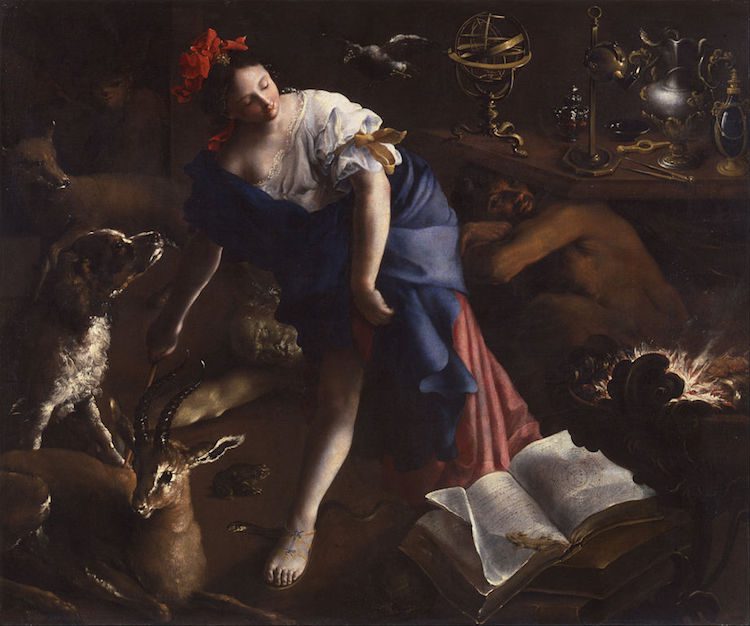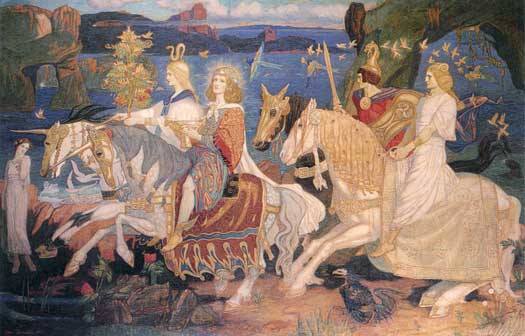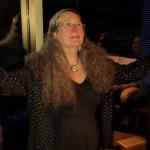It’s like a zen koan in a way: what is witchcraft?
Of course everyone will have their own ideas on the topic, some more inclusive and some more exclusive. It’s the nature of the subject because witchcraft has never really been a solid thing but has always had a bit of the amorphous to it, a bit of the mysterious. One person’s witch is another person’s wise woman and one scholar’s cunningman is another’s witch. This means that when we seek to define what witchcraft is we can either go with with the wide-ranging dictionary definition: “the use of sorcery or magic; communication with the Devil or a familiar; Wicca”* or we can follow personal definitions, whether those are our own or other people’s.
As with most complicated topics my own answer is multilayered, and works from the outside in.
So how would I define witchcraft?

In General
I’m not actually opposed to using the dictionary definition because it really does cover all the bases, doesn’t it? Beyond that though when asked the most basic answer I give for defining what witchcraft is, is that it’s the practice of working low or folk magic. I do differentiate witchcraft from high or ceremonial magic although I admit there can be a lot of fuzziness in that boundary. To me though witchcraft is a practice, not necessarily religious, that involves utilizing the kinds of magic that would have been available to everyone, including people without the money for fancy ingredients or tools, and people who religiously considered themselves Christian. I don’t see witchcraft as something limited to any particular spiritual view or religion, although it can be and often is linked to them.
Middle Ground
Obviously that definition is very broad. It also includes many people who would never have – or wouldn’t today – consider what they are doing witchcraft. And here’s the thing, from my point of view, while I might look at a particular practice and say it fits my definition of witchcraft I always try to respect a person or culture’s own labels. If a historic figure didn’t consider themselves a witch, and their community didn’t, and what they are doing is accepted as a folk practice – not witchcraft – then whatever I might think it is I’m going to respect the person or culture’s own terminology.
While I have a broad definition for what witchcraft is, in my opinion, but I don’t label people as witches unless that’s how they label themselves. So, digging deeper I’d say that witchcraft is the practice of magic that people doing it call witchcraft. Of course this isn’t necessarily clear either and sets up some tension between what one group might define another group as doing versus what that group itself might say it’s doing, but I think it’s an important consideration.
Personally
That all said I’m most comfortable defining witchcraft in the context of what I myself actually do, because I think in some cases it is best to speak only for ourselves and not for other people. This does however swing us from the overly broad to the overly specific. While the general definition is going to catch a lot of people in its net that would never call themselves witches or say they practice witchcraft, my personal definition is going to eliminate a lot of people who do call themselves witches and practice their own versions of witchcraft, and that’s obviously not my intention either, hence my middle ground approach above. I am well aware that my own flavour of witchcraft has its unique aspects.

Fairy Witchcraft
My tradition is Fairy Witchcraft – not to be confused with Anderson’s Feri Witchcraft – and what defines this witchcraft are the practice of folk magic and dealing with the Good Neighbours [read: fairies]. Those two things are intrinsically connected to my witchcraft to a degree that my understanding of what witchcraft is cannot be separated from either practice; I wrote about this previously on Patheos in my blog ‘Wild Witchcraft‘. I find it rather amusing that this hits on the first two of the dictionary descriptions, practicing magic and dealing with ‘the Devil or familiars’, fairy familiars being a part of my belief system. When I think of what witchcraft is, this blend of folk magic, Fairy Faith, and reconstructed early modern witchcraft is usually my starting point.
Defining Witchcraft
So, how do I define witchcraft?
The answer for me is nuanced and I think that’s how it should be. Witchcraft is not a simple subject nor is it straightforward and what it is will always be different to different people, not only the definition but also the actual practices. Perhaps in the end the dictionary definition and the broad general definition are the best ones because they include the most rather than excluding. When we are looking at something like witchcraft which historically was a practice of the disempowered seeking control over their lives and influence in a world that was hostile and dangerous to them it seems to me that inclusivity is the logical view to adopt.
*definition from the Merriam-Webster dictionary entry under ‘witchcraft’
___________________________
WHAT IS WITCHCRAFT? WHAT MAKES SOMETHING WITCHCRAFT? More Thoughts by Patheos Pagan Writers
What Makes it Witchcraft? by Martha Kirby Capo at The Corner Crone
What Is A Witch? Defining Witchcraft For Both Past And Present Day by Scarlet Magdalene at Tea Addicted Witch
The Ever Changing Face of Witchcraft by Ian Chambers at By the Pale Moonlight
What Makes Witchcraft . . . . Witchcraft? by Cyndi Brannen at Keeping Her Keys
What Makes it Witchcraft? by Kelden at By Athame and Stang
On the Necessary, Ineluctable Otherness of Witchcraft by Misha Magdalene at Outside the Charmed Circle
Witchcraft Has No Gatekeepers by Jason Mankey at Raise the Horns

















